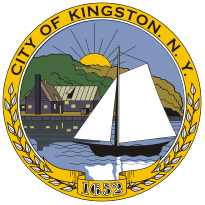|
RCBJ-Audible (Listen For Free)
|
Kingston Opts Into Tax Break Programs To Spur New Housing Options
 Kingston is a city of firsts. It was the first upstate city to opt into the Emergency Tenant Protection Act, enabling its local government to control rents in qualifying buildings built before 1974.
Kingston is a city of firsts. It was the first upstate city to opt into the Emergency Tenant Protection Act, enabling its local government to control rents in qualifying buildings built before 1974.
It is also now the first city to pass local laws opting into two new programs to spur affordable housing developments and increase the supply of available units in Ulster County’s only city.
Mayor Steven T. Noble has signed new legislation, the 421-P package of property tax exemptions, to encourage new housing development.
The legislation has two components: 421-P*2 Tax Exemption for New Accessory Dwelling Units and 421-P Tax Exemption for New Multifamily housing.
The 421-P*2 allows municipalities to partially exempt new ADUs (Accessory Dwelling Units) from taxation for 10 years (100% exempt during the first five years, with the exemption percentage declining over the subsequent five years) and allows the exemption for newly constructed or converted rental units with at least 10 units that guarantee at least 25% of the units are affordable.
To qualify for tax exemption, the attached or detached ADU must be a new unit that provides independent living facilities. ADUs cannot be used as short-term rentals and construction must take place after the effective date of the local law.
The 421-P program exempts newly constructed or converted rentals properties with multiple dwelling units from taxation and ad valorem (taxes based on valuation) levies. To qualify for tax exemption, the new structure must have 10 or more rental units and have been built on vacant or underutilized land. At least 25% of the units in the structure must be affordable to households between 60-80% AMI, and none of these affordable units may have households with more than 100% AMI.
Qualifying properties receive a full exemption during construction (up to 3-years) and an additional 25-year period of decreasing exemptions for the improvements made (beginning with a 96% exemption in the first year after construction, and then decreasing by 4% year thereafter). An eligible project cannot pay less in property taxes than it did prior to receiving the exemption.
More information on 421-P can be found here (421-P for multifamily dwellings) and here (421-P*2 for ADUs).
“I want to thank the Common Council for passing this new housing legislation, which I believe will spur the creation of much needed housing units in Kingston, helping us to reach our goal of approving 1,000 units of housing by 2029,” said Noble. “We need housing on every level and across the City. This legislation allows for both homeowners to create additional housing on their property as well as developers who want to create or redevelop larger housing projects.”
Beacon Joins Other Cities Opting For “Good Cause” Eviction Laws
![]() Beacon joins Albany, Ithaca, Kingston and Poughkeepsie in passing a “good cause” eviction law. For Beacon, this is the city’s second attempt – an earlier version was struck down in court last year.
Beacon joins Albany, Ithaca, Kingston and Poughkeepsie in passing a “good cause” eviction law. For Beacon, this is the city’s second attempt – an earlier version was struck down in court last year.
But statewide enabling legislation passed as part of New York’s 2024-2025 budget allows cities to opt-in to the legislation and define its scope to suit local needs.
In Beacon, good-cause eviction applies to landlords with more than one rental unit in buildings built before 2009, where tenants pay less than 345 percent of Dutchess County’s fair market rent, which amounts to about $4,895 a month for a one-bedroom unit.
Exemptions apply to cooperative and condominium rentals, landlord occupied buildings with fewer than 11 units, and to some workforce housing. Tenants in public housing or tenants protected under other programs like rent stabilization are not covered by the new law.
Covered tenants facing rent increases of more than 10% or more than 5% above the localized CPI, whichever is lower, will be able to defend against evictions in court.
Tenants who are nuisances, violate the terms of their leases, or fail to pay rent can still be evicted.
Beacon’s law is set to sunset in 10 years.
Governor Hochul Announces More Than $64.1 Million Awarded Through Restore New York Communities Initiative
More than $64.1 million has been awarded to 43 projects through the State’s Restore New York Communities Initiative. Restore New York supports municipal revitalization efforts with funds to help remove and reduce blight, reinvigorate communities and generate new residential and economic opportunities statewide. The program, administered by Empire State Development, is designed to help local governments encourage new commercial investments through community revitalization, growing local housing, and putting properties back on the tax rolls to increase the local tax base.
In the Mid-Hudson Region, the following projects were awarded
- City of Beacon – $1 million: GreenWORKS Studios, with the support of the City of Beacon, will transform a derelict former automotive garage located just off Main Street, Beacon’s primary commercial thoroughfare, into a vibrant community resource housing artist studios and spaces for community programming and events, as well as outdoor public space for community gatherings and public art installations
- City of Kingston – $550,000: Kingston Standard Brewing Company operates out of a smaller, newly-renovated building that sits on a lot with one other building: 2 Jansen Avenue, a 4,200 square-foot commercial building, of which half is vacant and blighted. KSBC plans to reconstruct that portion of the building while adding 2,200 square feet, transforming it into a cutting-edge zero fossil fuel facility. It will incorporate technology such as CO2 recapture, electric stream generation, and an offsite community solar farm, all to become a pioneering example of environmentally conscious craft beer manufacturing. The project will create eight new full-time manufacturing and administrative jobs.
- Town of Liberty – $650,000: The Parksville Main Street Revitalization Project’s next steps include two buildings for redevelopment. 2 Main Street was an abandoned synagogue, purchased to house The Parksville Arts Center. 29 Main Street is the second property and is being redeveloped into a commercial property to house local retailers.
- Village of New Paltz – $425,000: The restoration of the Ann Oliver House at 5 Broadhead will create a base of operations for the Dr. Margaret Wade-Lewis Black History Cultural Center. Funds will be used to renovate and restore a historic building of significance to local black history and culture.
- City of Port Jervis – $1.775 million: This project includes the demolition and reconstruction of a gutted and privately-owned 22,563 square-foot three-story brick building at 29 Front Street. The circa 1910 structure is located within the central business district and Downtown Revitalization Initiative focus area, and is beyond rehabilitation. The plan is to demolish and rebuild a new, architecturally consistent, high-efficiency insulated concrete form, seven-story mixed-use building with 26 basement storage units, two-to-four commercial spaces on the first floor and 32 variously sized apartments on floors two-through-seven.
- Ulster County – $1.6 million: This project involves the rehabilitation of an 11,000 square foot vacant historic Federal hotel anchoring the Shandaken hamlet of Pine Hill’s commercial and state-certified historic district at 310 Main Street. Intended reuse is 10 affordable workforce residential units, a café, and a food market open to the public.














